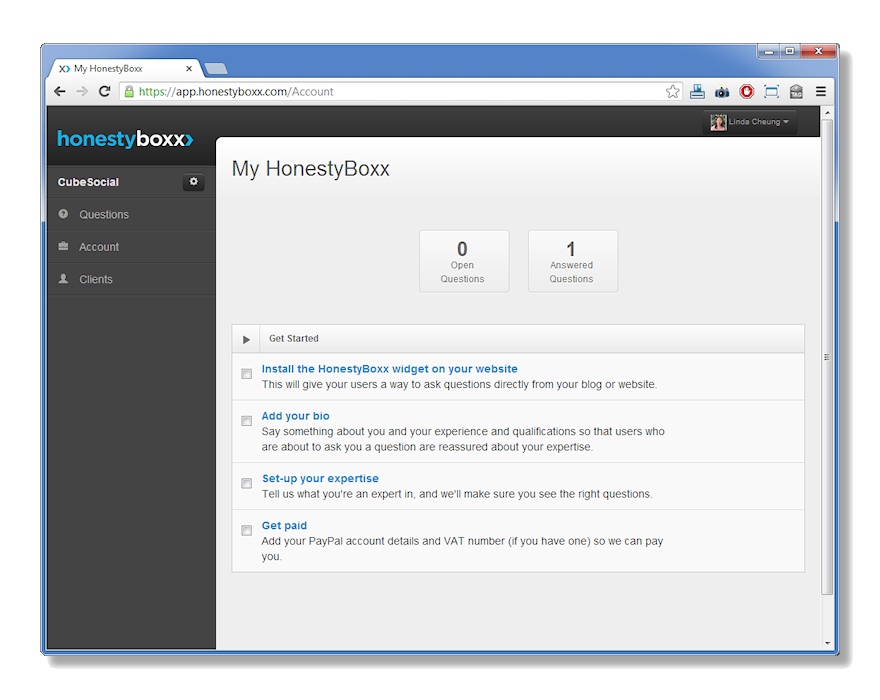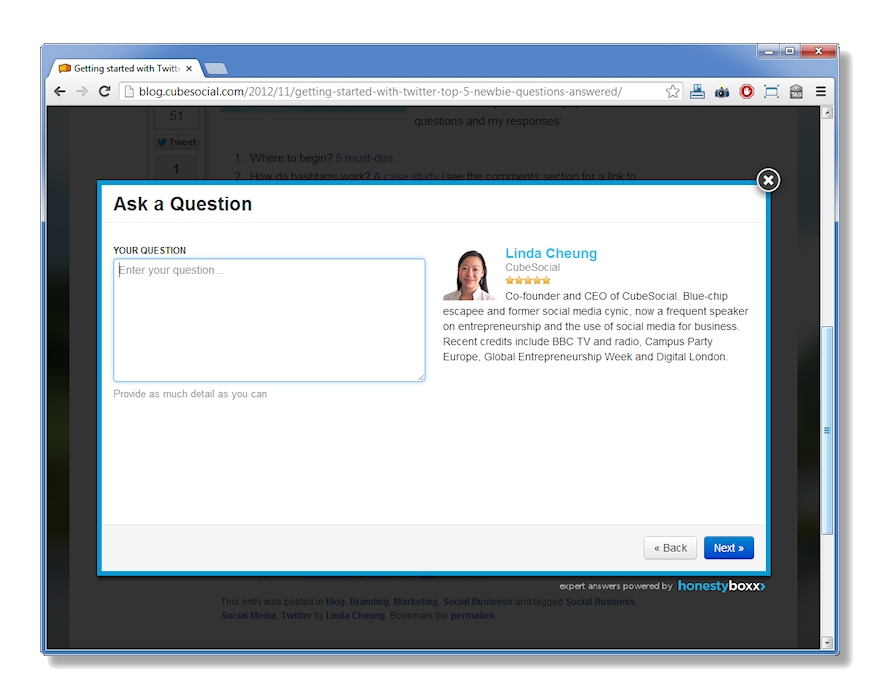Featured Startup on Azure - Honestyboxx
We'd like to introduce you to Mark Bower, CEO of HonestyBoxx, The app, in Bower's words:
Allows anyone to earn money from their blog or website by providing micro-consulting engagements to their visitors. It works just like the honesty box you sometimes see at small stores - only for websites.
When a business adds HonestyBoxx to their blog or website they’re telling visitors that they are happy to answer their questions in exchange for a fair fee. By providing an easy way to collect questions and payment from website visitors, HonestyBoxx instantly provides a new source of revenue and a stream of warm leads for larger pieces of work.
We thought this was interesting, for two reasons. First, it seems that this is another example of a read/write web that gives prominence to the interaction that consumers and web site visitors want with the people behind the brand logo. Second, from a technical perspective, this is a really ingenuous way to create an opening in what is often seen as a static web page environment.
So, we sat down with Bower and had an interview. Here's what he told us about being a startup in the UK, working on Azure as a solution, and the thoughts that go into being an entrepreneur.
Do you build for scale first, or for revenue? How are those things related in your mind?
Our take on this is that many people’s perceptions are skewed by a tiny number of mega-hits and the press they get. Behind that gloss though are thousands of real, revenue generating startups that don’t get nearly so much publicity. After talking to many angels and seed investors we’re in no doubt that being able to demonstrate real paying customers and revenues is what’s most valued.
Do you make reasonable predictions about how you are going to achieve revenue and then test them out, or do you start with a business model and deploy it, to see if it brings in revenue?
Azure and cloud computing make it tremendously easy to conceive an idea and a business model, deploy it, and see if it brings revenue. In that way cloud computing is the natural complement of Scrum, Kanban and other agile techniques. You can spend lots of time planning and surveying the market, but nothing beats getting real world feedback from real customers.
When did you decide that you were “startup material”?
For both me and my co-founder, Linda Cheung, running our own business had been a long held ambition. The final impetus came when both our fathers died within six months of each other. We both decided that life’s too short and this was the right time to get started, recession or not!
What are some of the challenges you face as a founder or developer at a startup, when it comes to dealing with family life, or socially? Does working on a startup change the way you associate and interact in these areas?
Start-up is a way of life. If you plan to do a start-up be prepared to make some sacrifices and be aware that it will have an impact everything else you do. My tip is that you can choose any two from start-up life, family life and social life. But you can’t have all three. Before you start, decide what you are prepared to forego.
Obligatory questions that assist us in marketing
Can you describe the relationship that you have had with Microsoft in building your startup?
We have had a good relationship with BizSpark, Azure and Windows 8 DPE teams. We have benefitted from group training sessions, reviews, phone advice and introductions the MSFT team has made. We are very happy with our relationship with Microsoft.
Why would an entrepreneur turn to Microsoft for help in building scale, a team, or using software?
Lots of reasons. There is an ecosystem of tools and platforms that just work together. There is one place to go for support, and no rival vendors blaming each other (been there, done that!). Microsoft do a good job these days of embracing standards making it easy to interoperate with other platforms. Developer productivity is second to none IMO with MS tool set. The people at MS are knowledgeable and trustworthy (see example in an answer later on). The people at MS really want you to succeed.
Tell us about your Azure based solution.
At HonestyBoxx we're solving the problem of how services businesses and consultants can stop giving their time away for free and start turning their audience into clients.
How is Azure implemented in your solution?
Our implementation utilizes cloud service, blob storage and SQL Server.
We chose SQL Server over SQL Database because we wanted flexibility to run SQL jobs and full text search.
We chose Cloud Service over Websites because we liked the staging/production deployment model that was available and the additional flexibility to configure Windows or install custom components during deployment.
We use blob storage for storing images and documents.
How did you get excited about Azure?
We got excited about Azure when we learned about learned how it made it possible to instantly deploy and scale applications but there was no requirement for long term contracts or minimum monthly payments. Instead just use what you need when you need it. That value proposition is amazing and as a start-up is hugely liberating.
One thing I should say is that by using Azure and BizSpark, we were able to build the entire HonestyBoxx solution you see today, deploy, test with a small preview group, and launch, all within just 7 weeks. That kind of ability to rapidly deliver ought to get anyone excited!
What were the Azure features that prompted you to decide to build on Azure?
As a start-up cash flow is everything. Building in the cloud means we don’t have to tie up cash in hardware. We can easily and cheaply try things out, put it out there, and see if our ideas work in the real world.
We can instantly spin up new servers when we have testing to do, or if we have a sudden peak in traffic, then take them down when we’re done. That means we only pay for what we use.
We also love that almost all the operational aspects are handled by Microsoft. No need for us to worry about patches, security updates, backups or hardware failures. It all just works.
What advice do you have for companies that are thinking about building in the cloud?
If you are thinking of building in the cloud, I’d recommend you go have a chat with your local Microsoft office. They have deep technical expertise that you can draw on to validate your decisions – and our experience is that they will give honest recommendations even when it’s not in their short-term financial interests. For us that’s hugely valuable and is a great basis for a long-term relationship.
Screenshots Below




